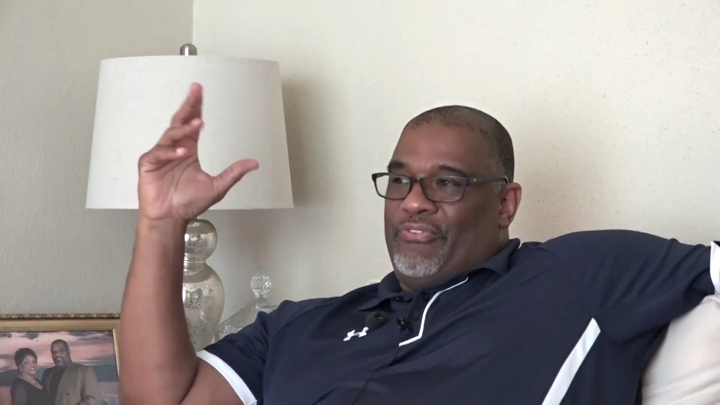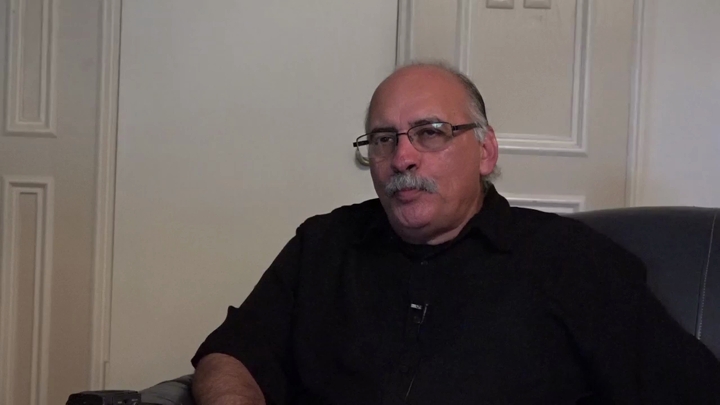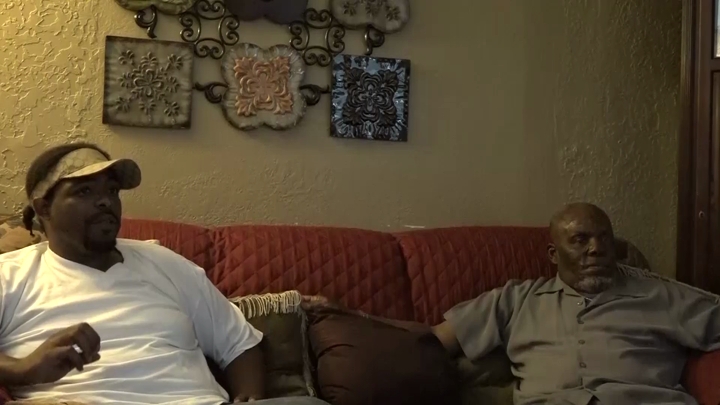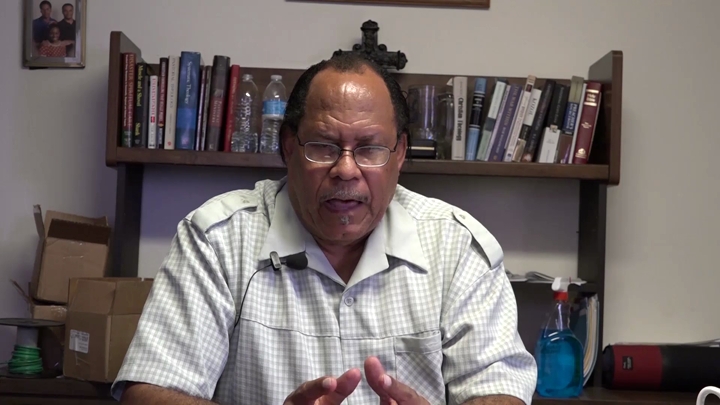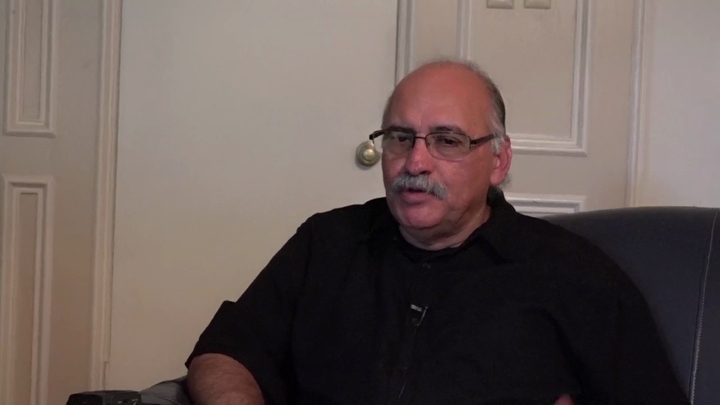Calyen / Changes in Conroe
sign up or sign in to add/edit transcript
Interviewer: How had Conroe changed since you leaving in 1968? Calyen: In 1995, Conroe had changed for the better because there were a lot of eateries that you could attend to. There were businesses popping up. Different subdivisions where people could live. You could pretty much live wherever you could afford. It had changed a whole lot from the time that I left until 1995 when I came back. You could see changes in the police department. There were other places—you look at other places, you’d say well, I don’t see any black people doing that. The ambulance drivers, you didn’t see any. You didn’t see any on the firetrucks. Some things were still the same. Interviewer: In terms of political representation, had there been change in political representation? Calyen: Yeah, Mr. Johnson was a city councilman. Billy Henry was a city councilman. Interviewer: And what’s Mr. Johnson’s first name? Calyen: Oscar. Interviewer: Oscar Johnson. Calyen: Other blacks had run for different other offices. Trustees and school boards and high school boards? Interviewer: Had run in and they got elected? Calyen: Yep. Interviewer: In terms of organizations, did you see any organizations in the area at this time like the NAACP or other? Calyen: Yeah, the NAACP had a chapter here and they were active. Interviewer: What did they have in terms of membership? What would you estimate their membership to be? Calyen: Maybe twenty? Interviewer: Why do you think they had such low numbers? Calyen: Probably, a lot of a people didn’t know that they existed. A lot of people didn’t want to be a part of it. Interviewer: In terms of other community organizations, can you think of any other community organizations that were prominent during that time period or now? Calyen: Now, we have a Concerned Citizens chapter, and anybody is eligible to become a member. It’s primarily a black organization. Interviewer: What kind of work does the Concerned Citizens— Calyen: They help people that have trouble paying tuition for schools or if they have trouble with hospital bills. On the other hand, if somebody is making a lot of whole lot of noise in the neighborhood, disturbing people, the Concerned Citizens will come, and have it checked out and see if it needs to be addressed at the police department or city council meetings. Interviewer: Why do you think that—why was that organization needed do you think? Calyen: There were a lot of concerns that wasn’t getting addressed and we had those on Tuesdays and Thursdays, you can go to the city council when they’re having their meetings and you can spell out your grievance to the city council. Interviewer: In terms of the black community and I guess, racial segregation, in terms of housing, is there still black neighborhood and white neighborhoods? Calyen: You can say yes, but if you go around the neighborhoods you’ll see people from all ethnic groups in the neighborhoods. So, there’s no such thing as a predominant neighborhood now. In the Dugan area, you’ll see a lot of Hispanic people there and you’ll see white people there as well. Interviewer: So, is there a larger Hispanic population in Conroe now? Calyen: Yeah. Interviewer: What percentage-wise would you say they make up? Calyen: They have to be 48 to 50 percent of the population. Interviewer: What percentage do black folks make up? Calyen: Fifteen to twenty. Interviewer: So, Conroe has become pretty diverse in terms of racial population? Calyen: It’s pretty diverse, yeah. Interviewer: How is that shown in political representation? Is there kind of a parity in terms of racial makeup and representation in politics? Calyen: If you look at it that way, you would say—if you look at it on a political roles, it’s all Republicans. There’s no Democrat that holds any offices in Conroe at all. Interviewer: Why do you think that’s the case? Calyen: It’s a good-old-boy town. So, people are still following some of these past achievements—years ago, this used to be an all-Democratic town. Interviewer: Wow. Calyen: Yeah. Interviewer: So, when did this switch happen? Calyen: During the seventies. Interviewer: Why do you think that happened? Calyen: Well, people had changes of minds about politicians. Interviewer: So, since the seventies, it’s been basically a red— Calyen: It’s a red— Interviewer: --red city. In terms of counties is it a red county? Calyen: Red county. Yeah, it’s a red county. Interviewer: So, in order to get elected, you more than likely have to be a Republican? Calyen: You have to be a Republican’s ticket. Interviewer: So, does that mean that the Republican party is more racially diverse in this type of area? Calyen: Now, don’t get this wrong. There are some good Republicans and there are some Republicans that still believe in Jim Crow, but most of the people that want to get elected will have on their ticket “Republican Conservative” to make sure that they do get elected. Interviewer: Even if they are ideologically Democrats, would they still say they are Republicans in order to get elected? Calyen: Yeah. Interviewer: Wow. (laughs) Calyen: Because I know some that are ideologically Democrats, but to get elected, they say conservative Republican.
| Interview | Interview with Henry Calyen |
| Subjects | Housing › Neighborhoods |
| Housing › Neighborhoods › Residential Segregation | |
| Community Organizations | |
| Community Organizations › Civil Rights Organizations › National Association for the Advancement of Colored People (NAACP) | |
| Race Relations | |
| Race Relations › Black-Brown Race Relations | |
| Geography › Places (Cities, Towns, Neighborhoods, and Intersections) | |
| Police and Law Enforcement | |
| Electoral Politics | |
| Electoral Politics › Democratic Party | |
| Electoral Politics › Republican Party | |
| Historic Periods › Jim Crow Period | |
| Tags | Johnson, Oscar |
| sign up or sign in to add/edit tags | |
| Interview date | 2016-07-06 |
| Interview source | CRBB Summer 2016 |
| Interviewees | Calyen, Henry |
| Locations | Conroe, TX |
| Duration | 00:06:38 |
| Citation | "Changes in Conroe," from Henry Calyen oral history interview with , July 06, 2016, Conroe, TX, Civil Rights in Black and Brown Interview Database, https://crbb.tcu.edu/clips/3505/changes-in-conroe, accessed March 03, 2026 |


